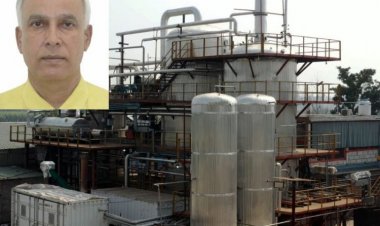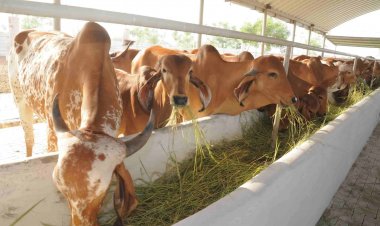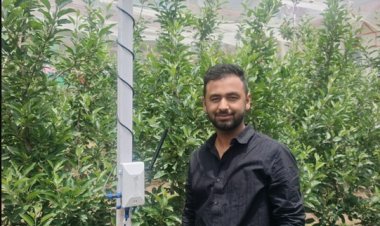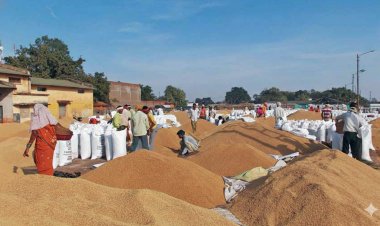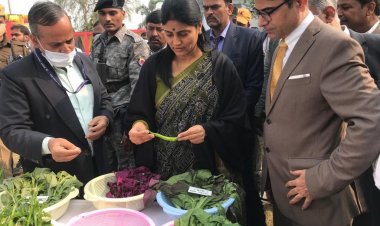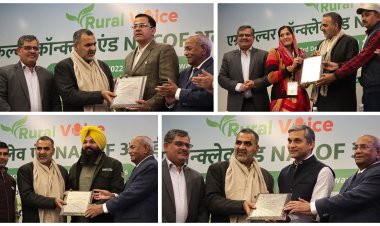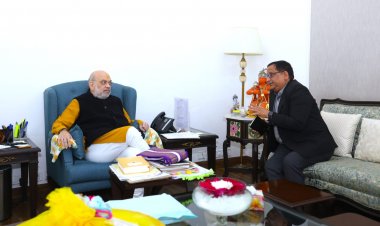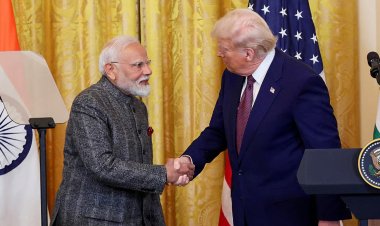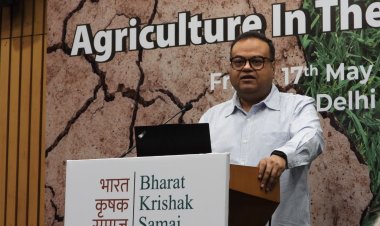Create an All India Panchayati Raj Services (IPRS) on the model of IAS, IPS, IFS, recommends a symposium on PRIs in Andhra
AGRASRI, an ICSSR grant-in-aid research institute for maintenance and development, organized a regional seminar on ‘Working of the PRIs in Andhra Pradesh: An Analysis’ in joint collaboration with the Department of Political Science and Public Administration, Sri Venkateswara University, Tirupati, on 23 April. Chief Guest Srinivasulu said that the introduction of the Grama Sachivalaya system was one of the finest reforms in recent times across the nation.
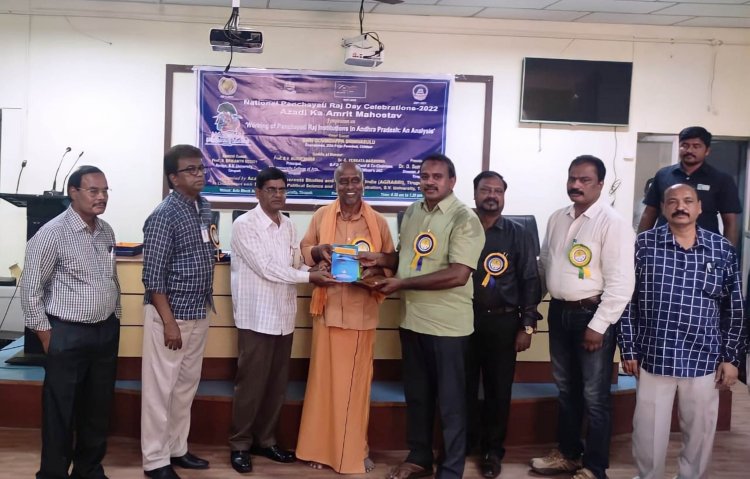
Against the backdrop of the new reforms launched by the State Government of Andhra Pradesh (AP), the Academy of Grassroots Studies and Research of India (AGRASRI), an ICSSR grant-in-aid research institute for maintenance and development, organized a regional seminar on ‘Working of the Panchayati Raj Institutions (PRIs) in Andhra Pradesh: An Analysis’ in joint collaboration with the Department of Political Science and Public Administration, Sri Venkateswara University, Tirupati, on 23 April as part of the National Panchayati Raj Day Celebrations and Azadi Ka Amrit Mahotsav.
Inaugurating the symposium, Chief Guest Srinivasulu said that the PRIs were the basic pillars of rural India and these people-friendly institutions provided day-to-day civic facilities to the nook and corner of rural people. He opined that the Gram Panchayat Development Plan (GPDP), capacity building and training, e-governance, and administrative capabilities ensure the elected representatives name and fame as grassroots-level policymakers.
Explaining the recent Panchayati Raj reforms introduced by the Government of Andhra Pradesh, Srinivasulu said that the introduction of the Grama Sachivalaya system was one of the finest reforms in recent times across the nation. Many State Governments have deputed their official teams to study the modalities and execution for implementing the system in their respective states. Today, nearly 16,000 Grama Sachivalayas are providing 544 civic services to the people at their doorsteps pertaining to the issues of 28 Departments within 72 hours after the registration of grievances by the rural citizen in Andhra Pradesh, he said.
“Panchayati Raj leadership is an asset and testimony to any upcoming leader for rendering public service delivery to the rural people and with due recognition by the people, sky is the limit to grasp the positions and recognitions in public life and my own experience itself is an example of elevation from Panchayat Sarpanch to Zilla Praja Parishad Chairperson,” said Srinivasulu.
At the end of his address, Srinivasulu spoke of his vision towards the sustainable development of Chittoor Zilla Praja Parishad pertaining to drinking water, education, health, agriculture, irrigation projects like Handri-Neeva with an outlay of estimated budget of Zilla Praja Parishad Rs 5,382 crores for the year 2022-23.
Presiding over the Symposium, Dr D Sundar Ram, Founder and Director of AGRASRI, said that Andhra Pradesh was the second state to introduce the Panchayati Raj system in the year 1959 after Rajasthan. It introduced the Mandal System in 1986. The Grama Sachivalaya system introduced in 2019 would occupy a predominant place in the annals of the AP Panchayati Raj history.
In strengthening the PRIs as true constitutional bodies, Dr Sundar Ram said that AGRASRI had been working for the village republics in India over a period of two decades through research, training, education and advocacy and today AP Panchayati Raj system was a role model to many states due to the introduction of the Grama Sachivalaya system and every citizen in rural Andhra Pradesh getting ample size of government welfare schemes at their door steps.
Guest of Honour Prof. BV Muralidhar, Principal of SV University College of Arts, said that the AP PRIs would improve their capacities and capabilities on Kerala model and transform as people-friendly institutions in delivering public services to the needy people in all respects. However, in delivering good governance in a transparent manner, the mindset of the policy makers and citizens would be changed in a congenial political atmosphere and friendly ruling and opposition relations in decision-making process.
Dr G Venkata Narayana, Mandal Parishad Development Officer and Co-Chairman of the AP Gazetted Officers JAC, observed that the PRIs were a boon to the rural people in providing all types of civic services at affordable rates and PRIs and rural people relations would be inseparable and unquestionable in many respects. Exploring the significance of the village panchayats right from the Pallavas and Cholas to the contemporary period, Dr Venkata Narayana made a clarion call that the Panchayati Raj elections would be held on non-party basis and consensus and that unanimity was the need of the hour at the village level for overall progress and sustainable development.
Dr Sundar Ram presented a set of research publications to ZPP Chairperson Srinivasulu and felicitated with mementos all the dignitaries of the function on the eve of the National Panchayati Raj Day celebrations.
Later, a panel discussion conducted on the theme of the symposium discussed the pros and cons of the Grama Sachivalaya system in Andhra Pradesh. Prof. Stanely Jaya Kumar, Dean, Development, SV University and Prof. P Vinayaka Murthy, Professor and Head, Department of Population Studies and Social Work, SV University, were the chairperson and co-chairperson of the panel discussion respectively.
Prof. Jaya Kumar said that the panchayati elections should be conducted on a non-party basis and all segments of people work together for betterment of their villages in all respects and the UN Sustainable Development Goals (SDGs) also stressed this concept.
Prof. Vinayaka Murthy said that due to lack of adequate funds many developmental programmes were kept pending and this hampered the progress and development of many Gram Panchayats (GPs). Discussing the village administration, he suggested that the GPs have freedom in the collection of taxes and be given to women empowerment in panchayats and vigorous capacity building and training be provided to the elected representatives of PRIs to meet any type of natural calamities and health hazards like the Covid-19 pandemic to safeguard the citizens of the villages.
K. Bochandra Reddy, MPTC Member of A. Rangampet, Chandragiri Mandal of Tirupati District, said that the Gram Volunteers have played a crucial role during the Carona Pandemic in Andhra Pradesh and increase their salaries and adoption of latest information technology applications for solving many problems and challenges at the GP level.
D Keshavulu, Sarpanch of Peruru GP, considered that the support and co-operation of the villagers were essential at the time of tax collection.
Dr G Srinivasulu, Panchayati Secretary of K Oddepalli GP, Pakala Mandal of Tirupati District, proposed that every GP should mobilize its own financial resources through natural resources apart from the Central and State funds for sustainable development as per the UN SDGs.
A Madhusudan, Panchayati Secretary of Thummalagunta GP, Tirupati Rural Mandal of Tirupati District, said that the National Panchayati Raj Day Celebrations should be conducted as festival of every GP for reviews the pros and cons of the achievements and failures in scientific manner. Speaking on the recent recommendations of the 15th Finance Commission of India, he proposed the allocation of the GST fund to the PRIs as per the criteria of the population. Every GP should approach the industrialists and philanthropists for receiving the funds for their developmental projects and work through Corporate Social Responsibility (CSR) and introduction of National Rural Services at the all-India level known as All India Panchayati Raj Services similar to the Indian Administrative Service (IAS), Indian Police Service (IPS), Indian Foreign Service (IFS), exclusively for looking after the administration of the Zilla Panchayats, Taluk Panchayats and GPs.
At the end of the session, the following recommendations were formulated in strengthening the PRIs as constitutional bodies in letter and spirit: (i) Create an All India Panchayati Raj Services (IPRS) on the model of IAS, IPS, IFS, exclusively for looking after the administrative and policy issues of the PRIs; (ii) Allocate the share out of the pool of GST Funds to the PRIS on par with the State Governments for utilising the funds for developmental activities in Rural India; (iii) Conduct the capacity building and training programmes in a regular manner with subject experts for the elected representatives of PRIs; (iv) Consider the allocation of certain percentage of CSR funds by the industrialists to the GPs; (v) Conduct a survey on the problems and issues of the PRIs once in a year through recognised research institutions for identifying alternative ways and means; (vi) Bring awareness among the women elected representatives of PRIs for performing their duties and responsibilities very freely and frankly as women policy maker,s especially SC, ST and BC categories; (vii) Conduct the Grama Sabha Meetings in the presence of Community Based Organisations and Self-Help Groups and identify the stakeholders in a transparent manner; (viii) Consider the PRIs as local self-governments and allocate 40% funds from the state budget by all state governments on the Kerala model; and (ix) Prepare GPDP with the involvement of the concerned GP citizens, experts, NGOs, SHGs, ANMs, CBOs, College and University Students for action plan and execution.



 Join the RuralVoice whatsapp group
Join the RuralVoice whatsapp group


















